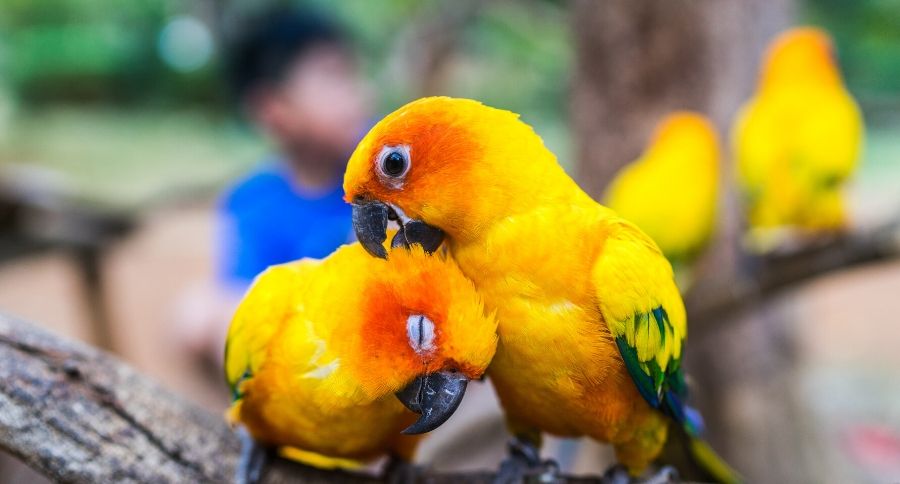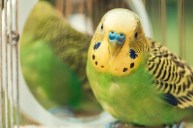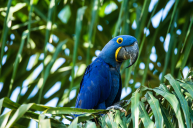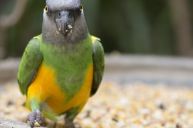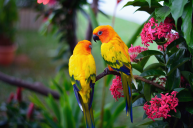Sun conures or sun parakeets are lively, vocal, and expressive. They are beautiful birds! There is one thing you must know though, this bird is one of the loudest parrots you can live with and their life expectancy is 25-30 years so do your research on this pet bird before you bring one home.
Bird experts at Lafeber tell us the males are brighter in color.
"The sun conure has a black beak, white rings around its eyes, and a long, tapering tail. The sunny's striking coloration and sweet temperament make it a favorite among pet owners and a darling with experienced aviculturists because it is easily bred."
The sun conure is native to South America, specifically Venezuela, Northern Brazil, and Guyana. So how do you care for these beautiful birds?
Care and feeding
https://www.instagram.com/p/B1hDPfqghNc/
These birds have a very typical diet.
PetGuide shares that a healthy and balanced diet for your conure is to get a commercial seed or pellet mix.
"They are filled with nutritious millet, sunflower, wheat, and barley seeds. To balance it out, make sure you add a regular dose of fresh fruits, green veggies, as well as nuts and selected cooked foods."
This pet bird will need a friend! They also need a lot of time outside their cage and this isn't a bird that likes to be left alone.
Spruce Pets has a great suggestion for bird enrichment.
"A play gym on top of the cage is ideal, as this is an athletic bird that loves to create its own tricks. The sun conure is less fanatical about bathing than some parrots, but most will splash about and bathe daily if the cage has a bowl of clean water each day. Conures do not like spray showers as much as some other parrots do."
This active bird will be happiest in a large enclosure; at a minimum, give it a cage 20 by 20 inches in footprint with a height of at least 36 inches.
Personality and sounds
https://www.instagram.com/p/ByXU2-zo6Ea/
Everyone wants to know if they talk. Well, research on this bird species tells us that they scream! The sun conure is extremely loud, capable of emitting ear-piercing screams. In the wild, this call is used to communicate with other birds miles away. Yikes!
They are deeply loyal but will bite if provoked. Some categorize them as playful clowns.
Health conditions and issues
https://www.instagram.com/p/Bw6ZQ8IhPKa/
We talk a lot about feather picking if they're bored so when we suggest a friend and time outside their enclosure this is one way to avoid behavioral issues.
Conures are also susceptible to Proventricular Dilatation Disease (PDD), Psittacine Beak and Feather Disease, Psittacosis, beak malocclusion, and Aspergillosis.
How long do they live?
https://www.instagram.com/p/BwuMA4Nh8Dz/
This is a bird you'll need to include in your will! Their life expectancy is 25- 30 years so make sure your family understands the commitment before bringing your sun parakeet home.
These are very social birds and they're talkers. They also need mental stimulation and regular checkups with a vet. These birds are beautiful but need a lot of care if you live with them. A common name is sun parakeet. An aviary would be a great enclosure to consider given you need to let them out so they can fly every day so make sure to research the proper size of their cage before you make the investment. Most birds are chewers so the play gym we mention needs to include lots of toys.
The Spruce Pets article reminds us that these wild birds are endangered.
They're found mostly in inland tropical habitats, the sun conure also may inhabit dry savanna woodlands and coastal forests. They usually inhabit fruiting trees and palm groves.
"This brilliant bird is currently endangered, with population numbers dwindling rapidly due to loss of habitat and trapping for the pet trade. It is estimated that roughly 800,000 are trapped each year, even though import into the United States was banned in 1992, and import to European Union nations was outlawed in 2007. Purchasers are advised to make sure the bird they buy is certified as captive-bred."
These little parrots are full of energy so research all the parrot species when you start considering pet birds. I'd argue that parrots are a lot of work! A macaw falls into this category too!
Have you ever seen a sun conure? Please leave us a comment below!
WATCH NOW: Budgerigars Are Little Birds!
